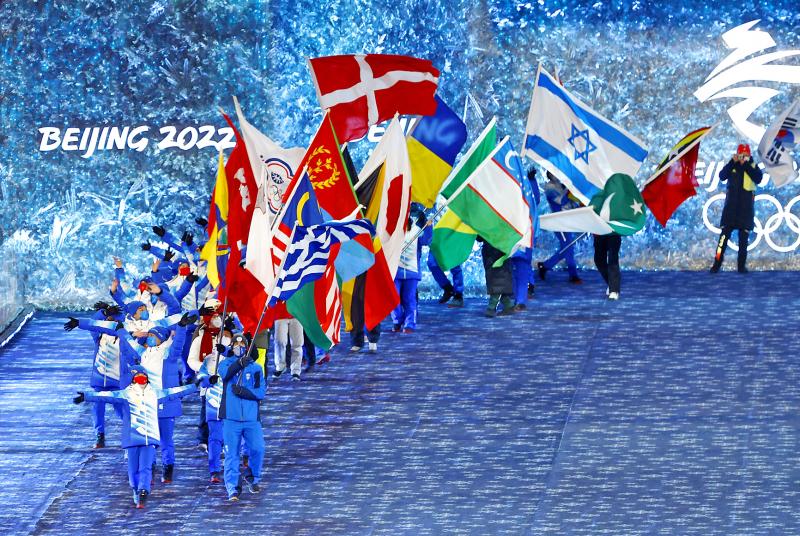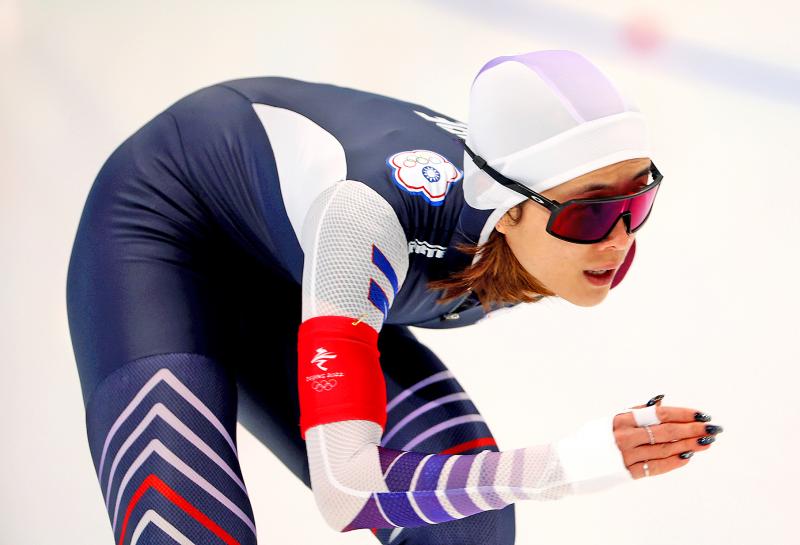After controversy sparked by Taiwanese speedskater Huang Yu-ting (黃郁婷), the Sports Administration yesterday announced that athletes who are to compete in the Asian Games in Hangzhou, China, in September would be given a clear set of rules to follow regarding conduct.
Huang drew widespread criticism for actions and comments she made before and during the Beijing Winter Olympics, which ended yesterday.
Before the Games began, the two-time Olympian uploaded a video on Instagram showing her wearing the Chinese speedskating team’s uniform while training in Salt Lake City, Utah.

Photo: Reuters
After the 1,500m speedskating race on Feb. 7, Huang told the Beijing Daily that she was touched by the enthusiasm of the audience at the race, as it “felt like I was competing at home.”
After the 1,000m race on Thursday last week, in which she placed 24th, Huang thanked her supporters on Facebook and said “the comment section is now open for haters and trolls.”
She posted the same remark on the Chinese microblogging Web site Sina Weibo, but added that “there are no trolls in the comment section” there.

Photo: EPA-EFE
Premier Su Tseng-chang (蘇貞昌) on Saturday asked the Ministry of Education and the Sports Administration to investigate Huang’s remarks and actions before and during the games to determine whether she should be punished.
Officials were also told to review existing rules and propose changes so that future national team athletes could have a clear code of conduct to follow when representing Taiwan abroad.
While Huang was Taiwan’s flagbearer at the opening ceremony of the Beijing Olympics, sports officials said on Friday that Lee Wen-yi (李玟儀), Taiwan’s first female Olympic Alpine skier, would carry the national flag at the closing ceremony.
Lan Kun-ten (藍坤田), the Sports Administration’s director of competitive athletics, said that the agency would soon gather representatives from the Chinese Taipei Olympic Committee and Chinese Taipei Skating Union to discuss Huang’s case, as well as her subsidies.
The agency would determine a penalty in one to two weeks, he added.
“We will finish amending the Regulations Concerning Audition, Training and Registration of Sports Coaches and Athletes for National Representative Team of International Games (國家代表隊教練與選手選拔培訓及參賽處理辦法) before the Summer [FISU] World University Games in June, so athletes competing in the Asian Games in China’s Hangzhou city in September can follow the code of conduct,” Lan said.
Chinese Taipei Olympic Committee acting secretary-general Steven Chen (陳士魁) on Saturday said that Huang is to participate in two tournaments in the US next month.
A meeting to review the Winter Olympics is likely to be held in April, as Huang needs to quarantine upon returning to Taiwan, he said.
A number of issues should be settled first to determine a penalty for Huang, Chen said.
Neither the national team athlete manual nor the information session for athletes before the trip to Beijing outlines how athletes should conduct themselves or indicate a punishment for misconduct, he said.
National team athletes are only disqualified if they breach anti-doping regulations or other sports regulations, Chen said.
What athletes say on social media and what they wear during practice do not constitute disqualification under the current regulations, he said.

NATIONAL SECURITY THREAT: An official said that Guan Guan’s comments had gone beyond the threshold of free speech, as she advocated for the destruction of the ROC China-born media influencer Guan Guan’s (關關) residency permit has been revoked for repeatedly posting pro-China content that threatens national security, the National Immigration Agency said yesterday. Guan Guan has said many controversial things in her videos posted to Douyin (抖音), including “the red flag will soon be painted all over Taiwan” and “Taiwan is an inseparable part of China,” while expressing hope for expedited “reunification.” The agency received multiple reports alleging that Guan Guan had advocated for armed reunification last year. After investigating, the agency last month issued a notice requiring her to appear and account for her actions. Guan Guan appeared as required,

Japan and the Philippines yesterday signed a defense pact that would allow the tax-free provision of ammunition, fuel, food and other necessities when their forces stage joint training to boost deterrence against China’s growing aggression in the region and to bolster their preparation for natural disasters. Japan has faced increasing political, trade and security tensions with China, which was angered by Japanese Prime Minister Sanae Takaichi’s remark that a Chinese attack on Taiwan would be a survival-threatening situation for Japan, triggering a military response. Japan and the Philippines have also had separate territorial conflicts with Beijing in the East and South China

A strong cold air mass is expected to arrive tonight, bringing a change in weather and a drop in temperature, the Central Weather Administration (CWA) said. The coldest time would be early on Thursday morning, with temperatures in some areas dipping as low as 8°C, it said. Daytime highs yesterday were 22°C to 24°C in northern and eastern Taiwan, and about 25°C to 28°C in the central and southern regions, it said. However, nighttime lows would dip to about 15°C to 16°C in central and northern Taiwan as well as the northeast, and 17°C to 19°C elsewhere, it said. Tropical Storm Nokaen, currently

PAPERS, PLEASE: The gang exploited the high value of the passports, selling them at inflated prices to Chinese buyers, who would treat them as ‘invisibility cloaks’ The Yilan District Court has handed four members of a syndicate prison terms ranging from one year and two months to two years and two months for their involvement in a scheme to purchase Taiwanese passports and resell them abroad at a massive markup. A Chinese human smuggling syndicate purchased Taiwanese passports through local criminal networks, exploiting the passports’ visa-free travel privileges to turn a profit of more than 20 times the original price, the court said. Such criminal organizations enable people to impersonate Taiwanese when entering and exiting Taiwan and other countries, undermining social order and the credibility of the nation’s